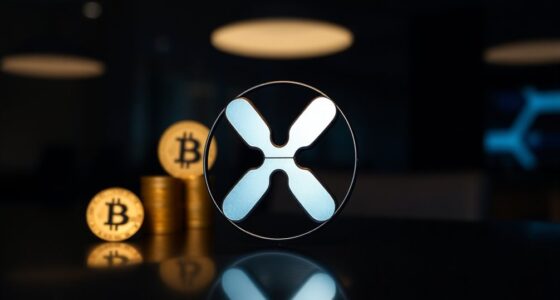Spark has moved $100 million from U.S. Treasurys into Superstate’s DeFi fund to chase higher yields through crypto arbitrage and tokenized assets. This strategic shift takes advantage of price discrepancies between spot crypto prices and futures, aiming for around 9.26% returns compared to falling Treasury yields. It reflects growing institutional confidence in digital asset strategies. If you want to understand how this innovative approach works and why it’s gaining traction, there’s more to explore.
Key Takeaways
- Spark allocated $100 million from USDS reserves into Superstate’s Crypto Carry Fund to enhance yield amid low-interest-rate environments.
- The move capitalizes on arbitrage opportunities between crypto spot prices and CME futures for higher returns.
- This strategic transfer reflects growing institutional confidence in crypto-based yield strategies and DeFi infrastructure.
- The investment aims to achieve approximately 9.26% returns while managing risk through market-neutral arbitrage.
- Superstate’s platform enables seamless, compliant tokenization of traditional assets, facilitating such large-scale institutional allocations.
Spark’s Strategic Allocation to Crypto Yield

Spark’s strategic move to allocate $100 million from its USDS reserves into Superstate’s Crypto Carry Fund reflects a deliberate effort to boost yield in a low-interest environment. By doing so, you’re shifting part of your stablecoin holdings into a high-yield, market-neutral crypto arbitrage strategy that targets around 9.26%. This approach exploits price discrepancies between crypto spot prices and CME futures contracts for assets like Bitcoin and Ethereum. With U.S. Treasury yields falling to about 3.98%, you’re seeking better returns outside traditional fixed income. The move demonstrates an active response to the current macroeconomic landscape, aiming to optimize reserve performance. It’s a strategic step to enhance income streams while maintaining a focus on risk management through a diversified, technologically advanced DeFi platform.
Overview of Superstate’s Tokenized Asset Platform

Superstate’s platform leverages a streamlined asset tokenization process that bridges traditional assets and DeFi. You can mint, redeem, and transfer tokenized securities with embedded compliance features that guarantee regulatory adherence in real time. This infrastructure allows seamless integration across blockchain and conventional systems, making it easier for investors to access and manage tokenized assets securely. Additionally, the platform incorporates Pimple Patch technology to enhance security and user experience.
Asset Tokenization Process
The asset tokenization process at Superstate transforms traditional financial assets, like U.S. government securities, into digital tokens that are compatible with blockchain technology. You start by selecting the underlying asset, such as Treasury notes, which are then registered within Superstate’s platform. Using smart contracts, these assets are converted into ERC-20 tokens or similar digital representations, making them easily tradable and programmable. You can mint tokens by depositing fiat or stablecoins, like USDC, through supported blockchain networks such as Ethereum or Solana. These tokens maintain a direct link to the original assets, ensuring transparency and authenticity. Additionally, recognizing angel number soulmate signs can help investors align their financial moves with intuitive guidance and potential future opportunities. Redemption involves converting tokens back into traditional securities or fiat, facilitated through automated processes that preserve regulatory compliance and enable seamless transferability.
Regulatory Compliance Features
Superstate’s platform embeds regulatory compliance directly into its tokenized asset infrastructure, ensuring that every transaction adheres to applicable laws and regulations at the moment of execution. This integration helps prevent illegal activities and maintains investor confidence. You benefit from real-time enforcement through on-chain features that automatically verify participant eligibility, transaction limits, and AML/KYC requirements. Key compliance features include:
- Embedded rules within smart contracts that validate transactions instantly.
- Customizable Allowlists to restrict access to approved investors.
- Automated monitoring for suspicious activity and regulatory reporting.
- Support for traditional and digital custodians, enabling flexible investor onboarding.
Incorporating diverse compliance tools, the platform ensures seamless operation within both traditional financial frameworks and innovative DeFi ecosystems. These tools work together to streamline compliance, reduce manual oversight, and foster trust in your asset management processes, all while operating seamlessly within the DeFi ecosystem.
The Mechanics of the Crypto Carry Fund’s Arbitrage Strategy

Crypto carry funds like the one managed by Superstate use arbitrage strategies to generate high yields by exploiting price differences between different markets. They typically buy crypto assets at spot prices while simultaneously selling futures contracts, locking in a margin known as the basis. When the futures price is higher than the spot, the fund profits from this spread as it holds the position until expiry. The strategy is market-neutral, meaning it seeks to reduce directional risk, focusing instead on the price discrepancy. To execute this, the fund leverages advanced trading infrastructure, including smart contracts and atomic swaps, enabling near-instantaneous, trustless transactions. By continuously balancing positions, the fund captures the basis differential, aiming for consistent returns regardless of broader market movements. Additionally, utilizing wall organization systems can help manage the digital assets involved in these complex strategies more effectively.
Implications for Traditional and Digital Asset Investors

Investors in traditional finance now face new opportunities and risks as tokenized government securities and high-yield crypto strategies converge. You can diversify portfolios with tokenized Treasuries offering liquidity and transparency, but must also navigate volatility and regulatory uncertainties. Consider these key implications:
Tokenized Treasuries offer new yields and flexibility amid evolving crypto and regulatory risks.
- Access to higher yields—up to 9.26%—compared to traditional Treasurys, appealing for income-focused investors.
- Increased exposure to crypto arbitrage strategies, which carry market-neutral risks like liquidity and price fluctuations.
- Enhanced flexibility through tokenization, enabling seamless redemption, custody options, and integration with DeFi platforms.
- Greater need for due diligence on blockchain compliance, custody solutions, and regulatory frameworks shaping this hybrid landscape.
- Utilizing sizing and load‑planning tools can help investors better understand the potential risks and rewards in this evolving market.
Balancing these factors requires understanding both the potential rewards and the unique risks of this evolving financial frontier.
Regulatory Compliance and On-Chain Enforcement Features

To guarantee compliance in the rapidly evolving DeFi landscape, Superstate integrates embedded on-chain enforcement features that automatically verify transactions against regulatory requirements. These features ensure that every transfer, mint, or redemption adheres to relevant laws in real time, reducing the risk of non-conformity. Using smart contracts, Superstate enforces restrictions like whitelists and transfer limits, automatically blocking unauthorized transactions. The platform’s on-chain compliance infrastructure supports seamless integration with existing regulatory frameworks, providing transparency and auditability. This approach allows investors to participate confidently, knowing that their transactions meet legal standards without sacrificing blockchain efficiency. By embedding enforcement directly into the transaction process, Superstate minimizes manual oversight and enhances trust, making compliance an intrinsic part of its DeFi ecosystem. Additionally, integrating popular juice brands insights into consumer preferences can help inform user engagement strategies for compliance-focused platforms.
The Rise of DeFi-Enabled Treasury Management

You’re seeing how institutional adoption of DeFi is transforming treasury management, offering new ways to optimize yields and enhance liquidity. As regulatory compliance becomes more integrated into platforms like Superstate, traditional finance is increasingly embracing these digital solutions. This shift signals a move toward more efficient, compliant, and flexible treasury strategies powered by DeFi technology.
Institutional DeFi Integration
As DeFi continues to mature, traditional institutions are increasingly integrating blockchain-based solutions into their treasury management strategies. This shift allows you to access higher yields, improve liquidity, and enhance transparency. Here’s what’s happening:
- You can allocate reserves directly into DeFi funds like Superstate’s Crypto Carry Fund, bypassing traditional intermediaries.
- Tokenized assets enable seamless deposits and redemptions using familiar digital wallets or traditional methods.
- Automated smart contracts facilitate trustless transactions, reducing settlement times and counterparty risks.
- Embedded compliance features ensure your operations adhere to regulations in real-time, maintaining security and legal integrity.
- Integrating regulatory compliance into DeFi platforms helps maintain trust and legality in institutional operations.
This integration makes DeFi a practical, scalable tool for institutional treasury management, blending traditional finance stability with blockchain innovation.
Regulatory Compliance Adoption
Regulatory compliance is becoming a cornerstone of DeFi-enabled treasury management, especially as institutions seek to harness blockchain’s efficiency without risking legal exposure. Superstate integrates embedded on-chain compliance, ensuring transactions adhere to regulations at execution. This approach allows you to participate in tokenized assets while maintaining oversight and legal safeguards. Superstate’s platform supports real-time monitoring, automated audits, and customizable access controls, bridging traditional finance and DeFi seamlessly. The table below highlights key compliance features:
| Feature | Benefit |
|---|---|
| Embedded On-Chain Rules | Automatic regulatory adherence |
| Real-Time Monitoring | Continuous oversight |
| Customizable Allowlist | Flexible access control |
| Automated Audits | Reduced manual compliance efforts |
| Segregated Asset Management | Enhanced security and legal protection |
Additionally, compliance enforcement ensures that regulatory standards are consistently maintained across all transactions, providing further confidence to users and institutions engaging with DeFi assets.
Market Environment and Yield Diversification Trends

Recent shifts in the market environment have driven DeFi protocols and institutional investors to seek higher yields beyond traditional fixed income assets. You’ll notice these trends shaping investment strategies as yields on U.S. Treasurys decline to around 4%, prompting a search for better returns. Here’s what’s happening:
Investors pursue higher yields as U.S. Treasurys drop to 4%, turning to DeFi and crypto strategies for better returns.
- Investors are diversifying into crypto-based yield strategies, like crypto basis trading, to capture higher returns.
- DeFi protocols are offering yields around 9.26%, markedly outperforming traditional bonds.
- Market-neutral arbitrage strategies are gaining popularity, exploiting price discrepancies between spot assets and futures.
- There’s a shift towards tokenized assets, providing liquidity and flexibility in yield generation while maintaining risk controls.
This environment encourages a move away from low-yield bonds toward innovative, digital asset-driven income sources.
Superstate’s Funding Milestones and Leadership Team

Superstate has demonstrated significant growth through strategic funding milestones, successfully raising a total of $18 million since its inception. In June 2023, it secured $4 million in a seed round led by ParaFi, Cumberland, and 1kx, providing initial capital to develop its platform. Later, in November 2023, it closed a Series A round, raising $14 million from investors like Distributed Global, CoinFund, Breyer Capital, and Galaxy. This infusion of capital supports team expansion, launching tokenized private funds, and refining compliant frameworks. The leadership team is headed by CEO Robert Leshner, a seasoned expert in DeFi and traditional finance. The company’s governance includes the Superstate Industry Council, composed of both traditional and digital asset investors, guiding product development and strategic growth.
Technological Infrastructure Supporting Tokenized Funds

You should consider how Superstate’s smart contract automation streamlines the management of tokenized assets, reducing manual intervention and errors. Embedded on-chain compliance guarantees transactions adhere to regulations automatically, increasing trust and efficiency. Additionally, seamless asset interoperability via atomic swaps allows you to easily move between traditional assets and cryptocurrencies without settlement delays or risks. Furthermore, emotional support strategies can help investors navigate uncertainties associated with digital asset management.
Smart Contract Automation
Smart contract automation is the backbone of tokenized funds, enabling seamless, trustless transactions and efficient management of digital assets. It guarantees that rules and processes execute automatically, reducing manual intervention and errors. You can expect these core features:
- Automated Deposits and Redemptions: Investors mint or redeem tokens instantly through smart contracts, streamlining entry and exit.
- Real-Time Compliance Enforcement: Embedded rules verify transactions comply with regulations before execution, safeguarding investor interests.
- Trustless Asset Swaps: Atomic swaps allow near-instant, secure exchanges between cryptocurrencies and tokenized assets without intermediaries.
- Transparent Governance: Automated voting and decision-making processes facilitate clear, tamper-proof management of fund operations.
- Enhanced Security Protocols: Implementation of robust security measures within smart contracts helps mitigate potential security vulnerabilities.
This infrastructure empowers you to manage and participate in DeFi funds confidently, with increased speed, security, and regulatory adherence.
Embedded On-Chain Compliance
Embedded on-chain compliance integrates regulatory rules directly into the blockchain infrastructure, ensuring transactions automatically adhere to legal requirements without manual oversight. You benefit from real-time enforcement that reduces compliance risks and streamlines operations. Superstate’s platform embeds rules into smart contracts, so when you mint, redeem, or transfer tokenized shares, each transaction is verified instantly against regulatory parameters. This automation eliminates delays and minimizes human error, maintaining adherence to KYC, AML, and other standards. You can seamlessly participate in DeFi ecosystems while ensuring your activities remain compliant. The system’s transparency allows regulators to audit transactions easily, fostering trust. By embedding compliance into the core infrastructure, Superstate simplifies steering complex legal landscapes, enabling institutional investors and traditional firms to confidently engage with tokenized assets.
Seamless Asset Interoperability
Superstate’s technological infrastructure enables seamless interoperability between tokenized assets and traditional cryptocurrencies, facilitating efficient and trustless exchanges. You can quickly convert assets without liquidity concerns or delays, ensuring smooth asset movement across systems. This is achieved through advanced protocols and smart contracts that automate the process.
Here are four key features:
- Atomic swaps allow instant, trustless exchanges between tokens and fiat-backed assets.
- APIs connect traditional custodians with DeFi platforms for smooth asset transfers.
- ERC-20 compatibility enables tokenized shares to integrate with Ethereum and DeFi apps.
- On-chain embedded compliance guarantees transactions follow regulations automatically.
This infrastructure simplifies asset management, reduces settlement risks, and fosters broader adoption of tokenized funds, making your investment experience more fluid and reliable.
Future Outlook for Crypto-Backed Fixed Income Strategies

As the crypto landscape continues to evolve, fixed income strategies backed by digital assets are gaining traction as a viable alternative to traditional bonds. You can expect more institutional investors to explore tokenized Treasury securities and crypto arbitrage strategies, seeking higher yields in a low-interest environment. The integration of blockchain technology and compliance features will make these strategies more transparent and accessible. Market-neutral crypto carry trades, like those employed by Superstate, could become mainstream as they offer attractive returns while managing volatility risks. However, liquidity, regulatory clarity, and risk management will remain critical factors shaping adoption. Overall, crypto-backed fixed income strategies are poised to expand, offering new opportunities for yield enhancement and portfolio diversification in the evolving financial ecosystem.
Frequently Asked Questions
How Does Superstate Ensure Asset Custody and Security of Tokenized Securities?
You’re protected because Superstate uses a bankruptcy-remote trust structure, segregating assets managed by trusted service providers. They employ secure custodians for digital assets and traditional custody solutions, ensuring your tokens are safe. Superstate also integrates embedded on-chain compliance and smart contracts, which enforce security and regulatory adherence automatically. Plus, atomic swaps and their robust infrastructure reduce settlement risks, giving you confidence in the security and custody of your tokenized securities.
What Are the Specific Risks Associated With Crypto Basis Trading Strategies?
Think of crypto basis trading as walking a tightrope—balancing potential gains against hidden risks. You face market volatility, liquidity constraints, and sudden price swings that can turn profits into losses. Leveraged positions amplify these dangers, while misjudged futures or spot prices increase the chance of unfavorable settlement. If market conditions shift unexpectedly, your arbitrage strategy can unravel, making it vital to stay vigilant and manage risks proactively.
Can Institutional Investors Easily Integrate Superstate’s Tokens Into Existing Portfolios?
Yes, institutional investors can easily integrate Superstate’s tokens into their portfolios. The tokens are ERC-20 compatible, meaning they work seamlessly with Ethereum wallets and DeFi apps. They can hold these tokens in self-custody, with digital asset custodians, or through traditional book-entry systems. Plus, the platform supports various transaction methods like minting, redeeming, and atomic swaps, making it flexible and straightforward to incorporate into existing investment strategies.
How Does Superstate Handle Regulatory Changes Across Different Jurisdictions?
Superstate stays super-savvy by staying super-sharp about shifting regulations across jurisdictions. It employs embedded on-chain compliance, ensuring transactions automatically adhere to local laws, and maintains a flexible, multi-layered legal framework. You’ll find Superstate swiftly adjusting its processes, actively aligning its operations with evolving rules. This proactive approach protects your investments, providing peace of mind, and makes sure your tokens stay legally legit, no matter where you’re invested.
What Are the Long-Term Implications of Tokenized Treasury Securities for Traditional Finance?
Tokenized treasury securities could reshape traditional finance by increasing liquidity, transparency, and accessibility. You might see faster settlement times and easier cross-border transactions, reducing reliance on legacy systems. This innovation could attract more institutional investors seeking efficiency and compliance. However, it also introduces new risks like cybersecurity threats and regulatory uncertainties. Overall, tokenization has the potential to modernize securities markets while challenging established financial practices.
Conclusion
You can see how Spark’s strategic shift signals a bold boundary-breaking move into blockchain-backed bonds. By embracing innovative infrastructure and integrating intelligent insights, you’re encouraged to explore evolving opportunities. As traditional trusts transform into tech-driven treasures, remember that embracing evolution empowers your endeavors. Stay savvy, seize the shift, and step boldly into the future of financial freedom where fearless funding fuels forward-thinking fintech.









